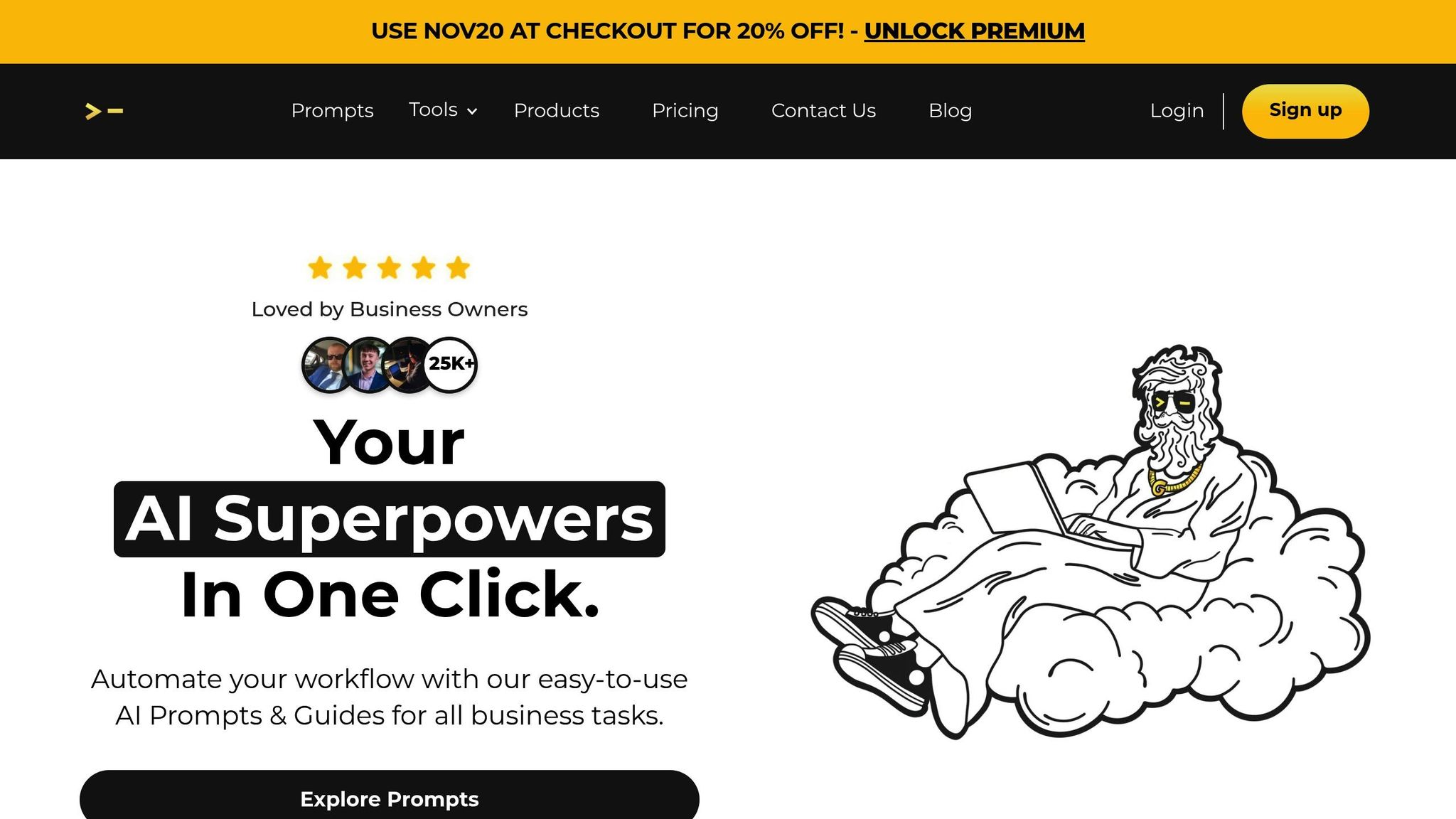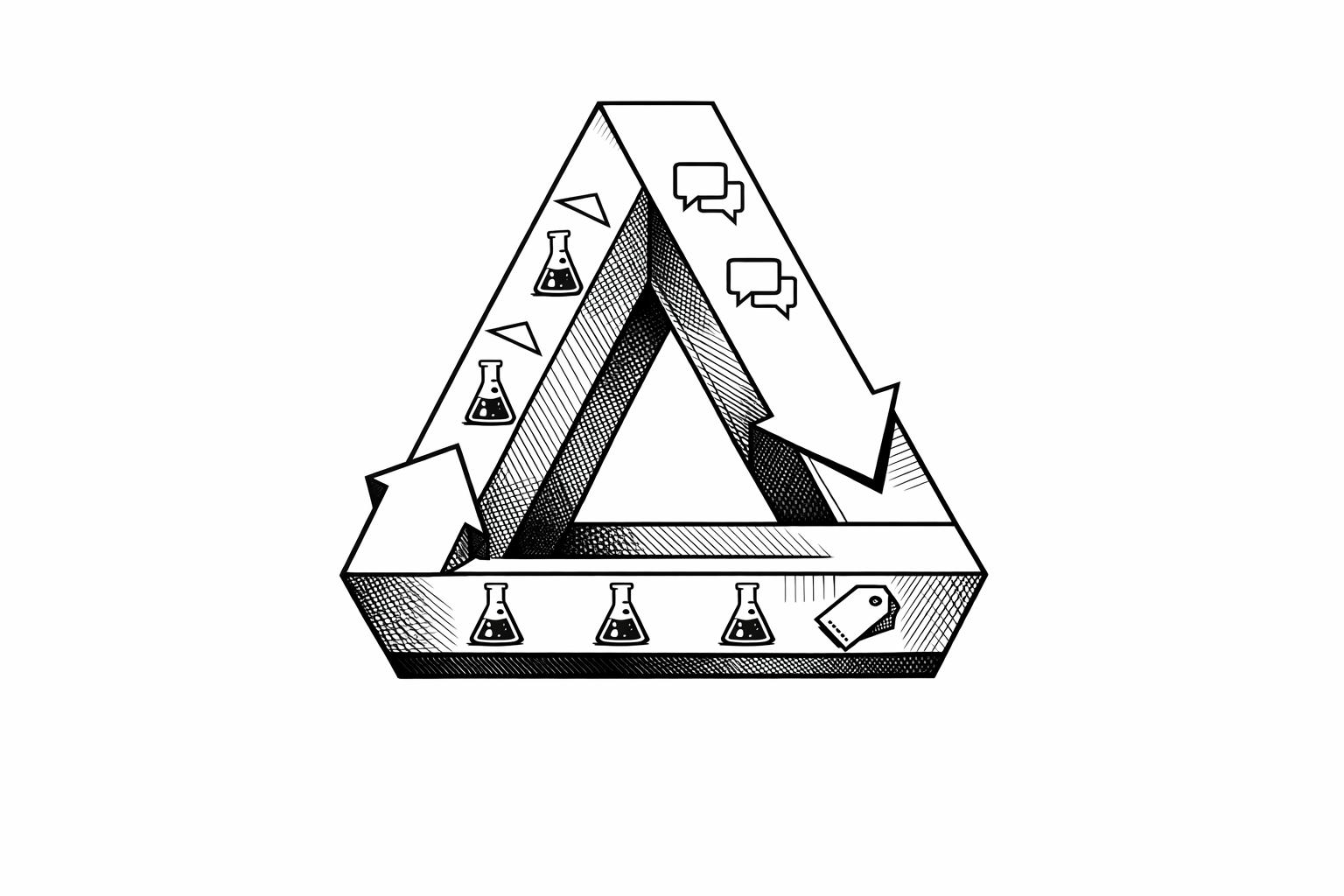How to Eliminate Prompt Trial and Error with Tested Collections

Tired of wasting time on AI prompts that don’t work? Tested prompt collections are the solution. Instead of struggling with trial-and-error, you can access pre-tested prompts designed to deliver consistent, high-quality results across tasks like marketing, SEO, and productivity.
Key Takeaways:
- Trial-and-error prompt engineering wastes time and leads to inconsistent results.
- Pre-tested collections provide ready-to-use, proven prompts for tools like ChatGPT, Claude, and Midjourney.
- Benefits include saving time, improving accuracy, and maintaining consistency across teams.
- Features like lifetime updates and customizable templates ensure these prompts stay relevant and effective.
Using tested prompts transforms AI from a frustrating experiment into a reliable tool for your business. Skip the guesswork and focus on results.
Problems with Trial-and-Error Prompt Engineering
Why Trial and Error Doesn't Work
The biggest flaw with trial-and-error prompt engineering is that it turns working with AI into a guessing game rather than a structured process. Starting from scratch every time you write a prompt means you're lacking any form of guidance. You might spend half an hour fine-tuning a single prompt, only to realize later that an entirely different approach would have been more effective from the start.
This approach comes with several major drawbacks. First, there's no system in place to share knowledge, so any progress is isolated. The slow feedback loop means you're stuck in repetitive cycles of trial and error. The problem gets worse when teams are involved. One person might figure out a decent prompt for a task like content creation, but that knowledge stays with them. Meanwhile, someone else on the team is wasting hours trying to solve the same problem, duplicating effort unnecessarily.
This leads to significant time loss. For example, marketers can spend hours tweaking prompts without understanding the principles behind effective ones. Not only does this drain productivity, but it also breeds frustration, making them less inclined to rely on AI tools in the future.
Another issue is the quality plateau. Without a clear understanding of proven techniques for crafting prompts, most people hit a ceiling where their results are just "okay." They might eventually get something usable after a lot of effort, but they'll never consistently achieve the high-quality output that comes from well-tested prompts.
These inefficiencies don’t just frustrate individual users - they ripple across the organization, dragging down overall productivity.
Impact on Business Productivity
The ripple effects of poor prompt engineering go beyond individual struggles and directly impact business operations. When teams rely on trial and error, project timelines become unreliable. Tasks that could be completed in 20 minutes with a well-crafted prompt end up taking hours of experimentation, derailing schedules and inflating costs.
This inefficiency also disrupts a brand's consistency. Inconsistent quality becomes a liability when different team members produce varying levels of output. One person might stumble upon a strong prompt for product descriptions, while another churns out generic, uninspired content. Customers notice these discrepancies, and without standardized prompts, maintaining a consistent brand voice becomes nearly impossible.
The problem compounds with new hires. Instead of building on the knowledge of existing staff, they’re forced to go through the same trial-and-error process. This means organizations repeatedly pay for the same mistakes to be made, wasting time and resources as each team member independently learns what works.
Another consequence is delayed decision-making. Poorly crafted prompts lead to unreliable AI outputs, eroding trust in the technology. Teams then spend extra time double-checking results, seeking alternative inputs, or reverting to manual processes - completely negating the efficiency AI is supposed to provide.
Over time, these frustrations lead to AI fatigue. Teams start viewing AI tools as unreliable and time-consuming, not because the technology itself is flawed, but because their approach to using it is inefficient. This skepticism often prevents businesses from fully benefiting from their AI investments, leaving untapped potential and productivity gains on the table. Shifting to a systematic approach with proven prompts is essential to overcoming these challenges and unlocking the true value of AI.
Prompt Engineering Guide: 2026 Edition (Steal My System)
Advantages of Tested Prompt Collections
Pre-tested prompt collections eliminate the trial-and-error process by offering strategies that are already proven to work. Instead of starting from scratch, these curated bundles provide refined prompts that have been tested in real-world scenarios. They directly address common challenges, paving the way for consistent and reliable AI outcomes.
Save Time and Effort
One major perk of using tested prompt collections is the significant time saved during prompt development. Instead of spending hours tweaking and experimenting, professionals gain immediate access to prompts that are ready to use.
This efficiency becomes even more valuable across teams and projects. For example, marketing teams can quickly generate product descriptions, social media posts, or email campaigns by tapping into a library of prompts tailored to specific needs. These collections streamline workflows and enable high-quality results across various tools, whether for text generation or visual content creation.
By standardizing AI workflows, these collections also make onboarding smoother. New team members can hit the ground running, producing consistent, high-quality outputs right away.
Better Accuracy and Consistency
Tested prompt collections are designed to deliver reliable and consistent results. They use refined language and proven techniques to reduce ambiguity, ensuring AI tools generate precise and accurate responses.
This consistency is especially important for businesses aiming to uphold brand standards. When team members rely on the same prompts for similar tasks, the output maintains a uniform tone, style, and quality. Whether it's tools like ChatGPT or Claude, these prompts are optimized for peak performance.
The benefits are particularly evident in complex tasks. For instance, business analysis prompts incorporate structured frameworks and targeted questions to ensure thorough coverage of topics. Meanwhile, marketing prompts use established copywriting strategies to boost engagement and conversions.
Technical applications also benefit from this precision. Prompts for code generation include detailed syntax guidance and error-handling instructions, while SEO-focused prompts align with current best practices to enhance search engine visibility.
Scale for Business Growth
In addition to ensuring consistency, tested prompt collections are a powerful tool for scaling AI operations as businesses grow. They provide a standardized foundation, allowing organizations to expand their use of AI tools without compromising quality.
This scalability becomes especially clear when onboarding new teams or launching new projects. Instead of having each group develop their own prompts, businesses can rely on existing collections that have already been proven effective. This approach minimizes inefficiencies and keeps workflows unified.
Take, for example, our collection of over 30,000 prompts designed for areas like business, marketing, and finance. These resources enable organizations to implement AI strategies across multiple departments, ensuring every team has access to specialized prompts tailored to their needs.
Moreover, lifetime updates ensure these collections stay relevant as technologies and business needs evolve. This means organizations don’t have to start from scratch when new AI capabilities or industry standards emerge.
For growing businesses, leveraging these scalable and adaptable collections can provide a significant edge in staying competitive.
God of Prompt's Tested Collection Features

God of Prompt's prompt collections are built around three standout features designed to replace uncertainty with proven strategies. These features aim to save time, reduce trial-and-error, and deliver consistent results.
Organized by Category and Tool
With over 30,000 prompts, the platform organizes its resources into clearly defined categories tailored to real-world business needs. For example:
- Marketing teams can dive into sections dedicated to social media campaigns, email marketing, and content creation.
- SEO experts will find prompts for keyword research, meta descriptions, and content optimization.
- Finance departments gain access to prompts for budget analysis, financial reports, and market research.
Each category is further sorted by AI tool. For instance:
- ChatGPT prompts focus on conversation starters and analytical frameworks.
- Claude specializes in document analysis and creative writing.
- Midjourney offers prompts for product photography and marketing visuals.
The Complete AI Bundle spans eight core business areas: Business, Marketing, Finance, E-Commerce, Education, Sales, Solopreneurs, and Productivity. This means teams don’t have to waste time hunting through multiple sources or creating prompts from scratch for different tasks.
This structured approach not only simplifies navigation but also ensures users can quickly find and adapt prompts to suit their needs.
Easy to Customize and Use
Every prompt is designed with flexibility in mind, featuring customizable variables that make it easy to adjust for specific industries, audiences, or brand voices. These prompts act as ready-to-use templates that retain their effectiveness across a variety of applications.
Notion integration takes usability a step further. It provides an intuitive dashboard where teams can organize, edit, and share prompts effortlessly. Users can build custom collections, add notes, and keep track of which prompts work best for their goals - all in one place. This eliminates the hassle of switching between platforms or losing track of effective workflows.
Customization is straightforward. Prompts often include placeholders like [PRODUCT NAME], [TARGET AUDIENCE], or [KEY BENEFITS], clearly indicating where adjustments are needed. For example, a marketing prompt might guide users to input their specific product details, target audience, and key selling points.
Teams can also combine prompts to create more advanced workflows. A content marketing team, for instance, might start with a research prompt to gather data, use a writing prompt to draft content, and finish with an optimization prompt to refine the output. This modular approach allows for complex, effective workflows without requiring technical expertise.
And to keep up with the fast-evolving AI landscape, God of Prompt ensures its tools stay updated.
Lifetime Updates Included
When you invest in God of Prompt, you're not just buying a static product - you’re securing access to a resource that evolves alongside the latest AI advancements and business trends. A one-time purchase comes with lifetime updates, ensuring your prompts remain relevant.
These updates include new prompt categories as AI tools expand their capabilities. For example, when ChatGPT introduced new features, corresponding prompts were added to help users take full advantage. Similarly, as Midjourney enhanced its image-generation capabilities, the platform updated its visual prompt collections to reflect these improvements.
Updates also adapt to changing business needs. When remote work became more prominent, productivity and collaboration prompts were added. As video content gained importance in marketing, new prompts for video scripts and social media content were introduced.
All updates are delivered automatically through the Notion workspace, so users always have access to the latest tools and strategies without lifting a finger. This ensures long-term value, making it a smart investment rather than a one-off purchase.
Plus, with a 7-day money-back guarantee, businesses can explore the platform risk-free, while lifetime updates ensure ongoing value for years to come.
sbb-itb-58f115e
Business Use Cases and Examples
Businesses turn to God of Prompt's curated collections to simplify operations and tackle inefficiencies head-on. Here's a closer look at how these prompts make a difference in marketing, productivity, and tool-specific tasks.
Marketing and SEO Tasks
For marketing teams, these prompts take the guesswork out of content creation, ensuring quality and consistency across projects. God of Prompt's marketing collection offers specialized tools for content generation, campaign planning, and SEO-focused tasks.
Prompts speed up the creation of platform-specific content. For example, a social media manager can generate posts tailored to each platform, complete with hashtags and engagement hooks. Email marketers can craft subject lines designed to increase open rates, while blog prompts help structure articles around targeted keywords and user intent.
SEO tasks that typically require hours of manual effort become much faster with targeted prompts. For instance, keyword clustering prompts help organize extensive lists into logical groups, simplifying content strategy planning. Meta description prompts ensure every page has a concise, search-friendly description, while content optimization prompts suggest improvements to boost rankings.
Campaign planning also gets a helping hand. These prompts guide marketers through building comprehensive strategies, from identifying target audiences to crafting messaging frameworks and planning multi-channel campaigns. Instead of starting from a blank page, teams can rely on proven templates to cover all the essentials for successful campaigns.
Productivity and Task Automation
Productivity takes a leap forward when repetitive tasks are streamlined with automated prompts. God of Prompt's productivity collection focuses on optimizing workflows, managing meetings, and improving team collaboration.
Meetings become more efficient with prompts that structure agendas, generate follow-up summaries, and track action items. Instead of scrambling to recall decisions after a meeting, teams can use prompts to organize discussion points and assign responsibilities automatically.
Document creation is faster and more reliable. Prompts for project proposals, status reports, and business plans provide structured templates that ensure no critical details are overlooked. Teams maintain a professional standard while cutting down on time spent formatting and organizing.
Complex projects also benefit from these prompts. Task delegation and project management prompts break projects into manageable steps, identify dependencies, estimate timelines, and allocate resources effectively. Project managers can develop detailed plans without starting from scratch.
Communication improves as well. Prompts standardize updates for clients, internal announcements, and stakeholder reports, ensuring a consistent tone and thorough coverage of key information.
Tool-Specific Applications
Each AI tool has unique strengths, and God of Prompt's collections are tailored to maximize these capabilities. By using pre-tested prompts, businesses eliminate trial and error, unlocking the full potential of these platforms.
- ChatGPT: Excels at conversational tasks and data analysis. Business analysts use it for market research, data interpretation, and competitive analysis. Customer service teams rely on conversation prompts to address common inquiries and handle escalations, leveraging ChatGPT's strengths in dialogue and reasoning.
- Claude: Ideal for document analysis and creative writing. Legal teams use Claude prompts to review contracts and highlight key clauses, while content teams depend on it for long-form writing, editing, and refining. Claude's ability to manage complex documents and maintain context makes it a powerful tool.
- Midjourney: Transforms visual content creation for marketing and design teams. E-commerce businesses use product photography prompts for consistent, professional-looking images. Marketing teams generate social media graphics, ad concepts, and brand imagery with ease. The Midjourney Bundle includes over 10,000 visual prompts tested for optimal image generation.
Each tool-specific collection comes with detailed how-to guides, teaching users not just which prompts to use but also how to customize them for specific needs and chain them together for more complex workflows. Plus, lifetime updates ensure the prompts evolve alongside the tools, keeping them relevant as new features are introduced.
How to Add Tested Prompts to Your Workflow
Incorporating tested prompt collections into your workflow can streamline operations without disrupting your existing processes. Many teams see improvements when they adopt a gradual, structured approach to implementation.
Step-by-Step Setup Process
Start by pinpointing the tasks that consume the most time when using AI tools - whether it's writing content, analyzing data, or managing customer communications. Focus on one specific workflow to begin with. For example, if your marketing team regularly creates social media posts, try using God of Prompt's marketing collection for this task instead of rolling prompts out across every department simultaneously. This targeted approach allows you to measure results and fine-tune the process before expanding further.
Tailor prompts to fit your company's language and style. Save these customized versions in a shared workspace so your team can easily access them. Including your organization's terminology, style guidelines, and industry-specific nuances makes the prompts more effective and aligned with your needs.
Provide hands-on training for your team. Have them use the prompts for tasks they previously handled manually, then compare the results side by side. This direct comparison often wins over even the most skeptical team members by demonstrating the value of these pre-tested collections. Track metrics like time saved and the consistency of outputs right away to quantify the benefits of your tailored prompts.
This methodical approach makes the advantages of tested prompts stand out clearly compared to manually creating them from scratch.
Tested Collections vs. Manual Prompt Creation
In daily operations, the benefits of tested prompt collections over manual prompt creation quickly become apparent. These collections are designed for efficiency and ease of use, offering several key advantages:
- They save time and effort while delivering consistent, high-quality results. Built-in guides and structured frameworks also make them easier to learn and use.
- They allow for scalable deployment across teams without requiring every team member to become an expert in prompt engineering.
- They include automatic updates, ensuring your prompts stay relevant and effective.
Using tested prompts is more about strategy than just crafting syntax. They guide AI to produce meaningful, targeted outputs rather than vague or irrelevant responses. This strategic foundation removes much of the trial and error associated with manual prompt creation.
Regular updates amplify these advantages, keeping your prompts aligned with the latest AI advancements.
Stay Current with Regular Updates
Once your workflow is running smoothly, God of Prompt's lifetime updates ensure your prompt collections remain relevant as AI technology and business needs evolve. These updates often include new prompt variations, better customization options, and adjustments for emerging AI features.
Set up a monthly review process to evaluate new prompts and updates. Assign a team member to review these updates and identify potential improvements for your workflow. Staying proactive ensures your processes stay aligned with the latest AI capabilities.
Engage with user communities to share and discover creative ways to customize prompts or adapt them for specific scenarios. These discussions can spark ideas for combining prompts or tailoring them to unique business needs. Document your customizations and successful prompt combinations in a shared knowledge base. This way, when updates roll out, you can quickly assess which changes will enhance your workflow without disrupting your current setup.
Conclusion: Get Better Results with Tested Prompts
Moving from trial-and-error to using tested prompt collections is a game-changer for businesses leveraging AI. With God of Prompt's extensive library of over 30,000 refined AI prompts, you can skip the guesswork and focus on results across a variety of use cases.
The available bundles cater to different needs, from entry-level options to more comprehensive packages, allowing businesses to choose what works best for them. Plus, every bundle includes lifetime updates, ensuring your tools stay relevant as AI technology advances.
Tested prompt collections save time and resources by delivering consistent, reliable outcomes right away. Whether you're working with ChatGPT, Claude, or Midjourney, these prompts remove the inefficiencies of experimentation, letting you achieve better results with less effort.
With a 7-day money-back guarantee and lifetime updates, there's little to lose and a lot to gain. For businesses looking to maximize their AI investments, tested prompts provide faster implementation, greater efficiency, and long-term productivity improvements.
Say goodbye to endless trial-and-error and start using proven AI practices to turn AI into a powerful asset for your business.
FAQs
How can tested prompt collections help enhance AI-generated content?
Tested prompt collections simplify the creation of AI-generated content by providing pre-made, well-structured prompts. These are designed to offer clear guidance and context, helping AI generate consistent, accurate, and relevant outputs.
Using these ready-to-go prompts can save you time, minimize mistakes, and deliver results better suited to your specific goals - whether you're focusing on business, marketing, or productivity. They're an incredibly useful asset for tools like ChatGPT, Midjourney, and Claude.
What are the benefits of God of Prompt's lifetime updates for prompt collections?
God of Prompt offers lifetime updates, giving you ongoing access to the most up-to-date and effective AI prompts - at no extra cost. These updates ensure your prompt library stays aligned with the latest advancements and shifting trends in technology.
With lifetime updates, you can streamline your workflow, enhance the quality of your results, and tackle specific challenges in areas like business, marketing, and productivity. This means less guesswork and more consistent, goal-oriented outcomes.
How can businesses seamlessly use tested prompt collections to boost productivity?
Businesses can boost productivity by weaving pre-designed prompt collections into their daily processes. Here's how to get started: pinpoint repetitive or time-draining tasks, then choose prompts specifically designed to address those challenges. Adjust these prompts to include relevant business data, ensuring they align perfectly with your objectives.
For smoother implementation, assign clear roles for managing these prompts and set up safeguards to maintain consistency and quality. By embedding these ready-made prompts into everyday workflows, companies can save time, enhance output, and concentrate on more strategic, high-value activities.





















